You’re investing a TON of time, money, and energy towards your future.
You’ve gotten the grades, done a bunch of extracurriculars, improved your real-world skills, and become the type of applicant that top-tier nursing programs in Canada look for — you’ve put in the work.
As if doing all that wasn’t stressful enough, now you have to decide where you want to spend the next few years of your life and complete your undergrad degree.
We get that it can be really stressful to make such a big decision about which university aligns to your unique interests, goals, and aspirations.
That’s why we’ve put together this list of the best nursing schools in Ontario and Canada more generally (with a focus on undergraduate programs, in no particular order).
It’s time to get rid of all the questions and hesitation that might be floating around in your mind.
Here you’ll find a comprehensive breakdown of the standout features of the best nursing schools in Canada — all in one place — so you can be confident that you’re making the right decision for your future.
And just remember — you don’t have to go through this process alone! Our Youth Coaches™ are alumni of all the programs listed below and they have helped hundreds of students choose the program that’s right for them (as well as helping them succeed once they’re in university). If you’re looking for an objective mentor to help you through this process, connect with a coach now for support.
We also have a ton of free resources, including comprehensive program guides, application prep guides, skills building guides, and more.
To stay up to date on the latest content to empower you to fulfill your potential follow our channel on YouTube and subscribe to our monthly newsletter (by submitting your email at the bottom of this page).
U of T Nursing (Toronto, Ontario) – One of the Best Nursing Programs in Ontario for Comprehensive Curriculum & Professional Development
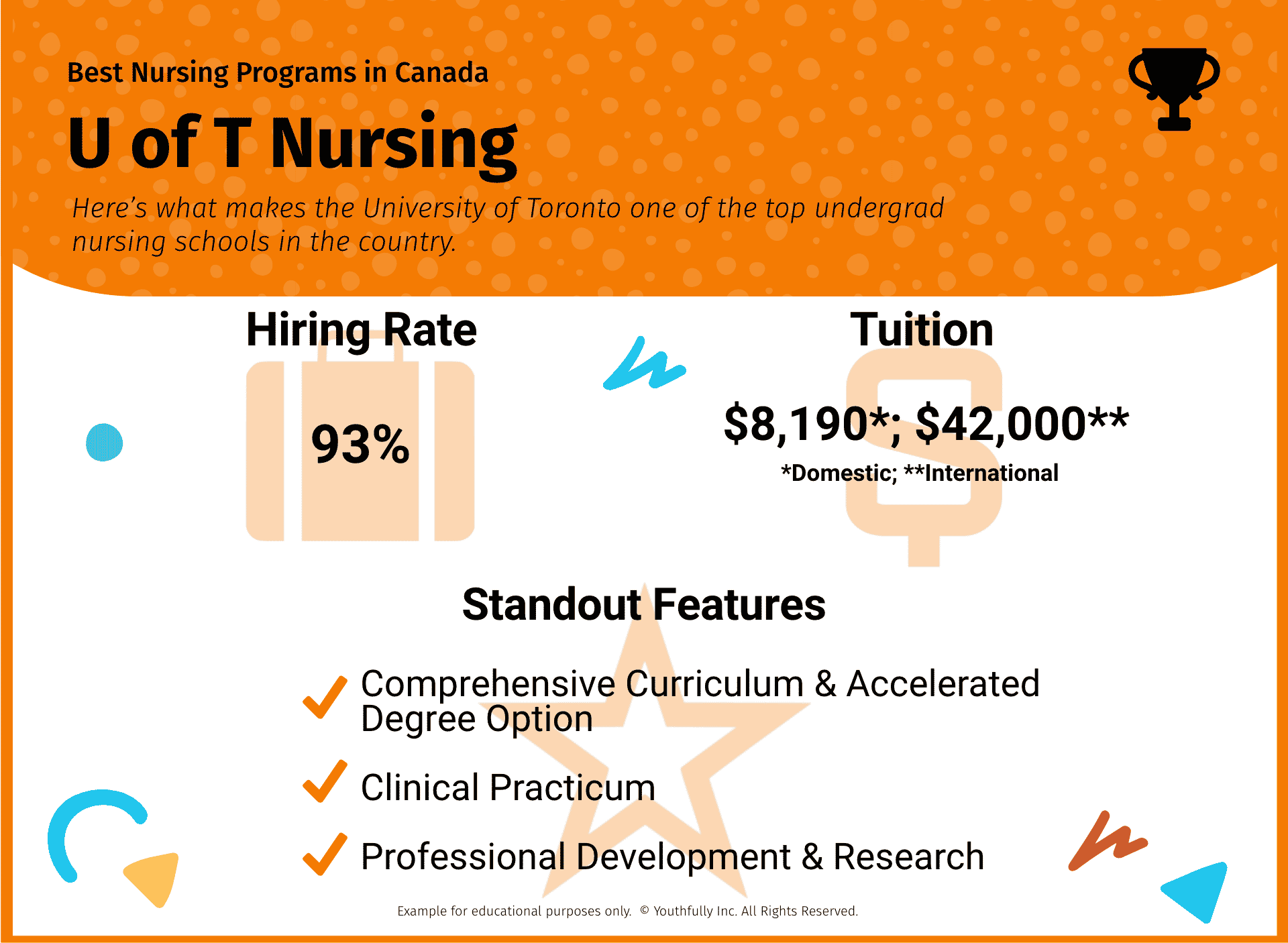
The University of Toronto’s Lawrence S. Bloomberg Faculty of Nursing has long been recognized as a top nursing school in Canada.
U of T’s Bachelor of Science in Nursing (BScN) degree provides students with a comprehensive, foundational curriculum that covers all essential aspects of the nursing practice. It combines theory, research, and clinical practice, so that you have a broad and strong knowledge of all aspects of nursing.
What makes the nursing program at U of T Nursing stand out is its accelerated 2-year program. Students of U of T Bloomberg Nursing must complete 2 years of studies from a recognized university prior to admission (with at least 10.0 U of T or equivalent credits), including a minimum GPA requirement and prerequisite courses (see the full list of requirements here).
This structure definitely has some pros and cons. A big pro is that for the first 2 years of your undergraduate studies, you’ll be able to explore various research areas and faculties.
The prerequisite courses for nursing (1.0 credit in Human Physiology, 1.0 credit in Statistics, 1.0 credit in Social Sciences, and 1.0 credit in Humanities) ensure that you have a solid foundation to help you excel once you start the Bachelor of Science in Nursing (BScN) program.
Taking classes in these areas will provide you with a well-rounded education and let you take courses in things you might not otherwise (Art, History, Geology, Hypothesis Testing, Anthropology, Economics — the list goes on and on). We have so many students tell us that some of the best courses they took in university weren’t even entirely related to their study area, but this flexibility was key to helping them learn about other areas of interest.
A potential drawback of the accelerated nursing program is that you need to be prepared for an intense and extremely demanding 2 years once the BScN program starts. Don’t let that deter you, though. If you build solid time management and organization skills early on, you’ll be able to get through the program just fine (connect with us to learn how to strengthen these skills).
For both years in the U of T Nursing program, you will have a mandatory list of courses. In the first year, you’ll take various foundational courses, like Introduction to Nursing Practice, Introduction to Acute Care Nursing, Nursing Perspectives, and much more. The knowledge that you gain in your first year can be applied to all clinical settings, which is good if you aren’t exactly sure what your main area of interest is and what career path you want to pursue.
Once you’re in your second year, you will continue to build your comprehensive knowledge through more focused courses, like Medical Microbiology, Policy, Ethics, and Leadership, Community Health. As mentioned above, you will definitely be totally focused on your studies for the whole 2 years, but the solid education you will get from this program will be invaluable.

Lawrence S. Bloomberg Faculty of Nursing, University of Toronto, image credit
Another thing that makes U of T Nursing one of the best nursing programs in Canada is the clinical practicum at the end of Year 2. This 11-week placement is chosen in collaboration with the Bloomberg faculty and takes into consideration your career goals and areas of interest. U of T Nursing has various placement partners, and Toronto itself is full of some of Canada’s leading teaching hospitals and community organizations.
The practicum will give you the opportunity to apply what you’ve learned during the program and gain real-world experience. It will also help you build a network of industry contacts that you can draw upon after you graduate (and many U of T Nursing students actually get hired on at the location of their placement after the 11 weeks is over).
U of T Nursing also focuses on providing professional development opportunities and exam prep, while ensuring that its students are up to date on the latest knowledge and can adapt to the ever-changing healthcare environment.
Their Centre for Professional Development offers 5-10 weeks courses, where you can earn certificates in many areas, like leadership and management, hospital and acute care, wound management, and more. They also have NCLEX-RN exam prep which is a great opportunity if you plan to become a Registered Nurse.
DID YOU KNOW?: These courses are all available online, as well as through an in-class and hybrid model. That means that you can take them at your own pace, which is key since you’ll already be really busy with your other coursework.
The Centre for Professional Development also has opportunities for students to broaden their education to an international level with the Global Nursing Scholars Program and conferences that are focused on international issues within nursing healthcare.
We highly recommend that you take advantage of all of these professional development opportunities because they will broaden your knowledge even more and make you more competitive as you apply to jobs when you graduate.
If you’re thinking about applying to U of T Nursing, connect with a coach to see if this program is the best fit for you. We’ve helped hundreds of students improve real-world skills, stand out on their applications, and get accepted to this top nursing program.
You Might Also Like
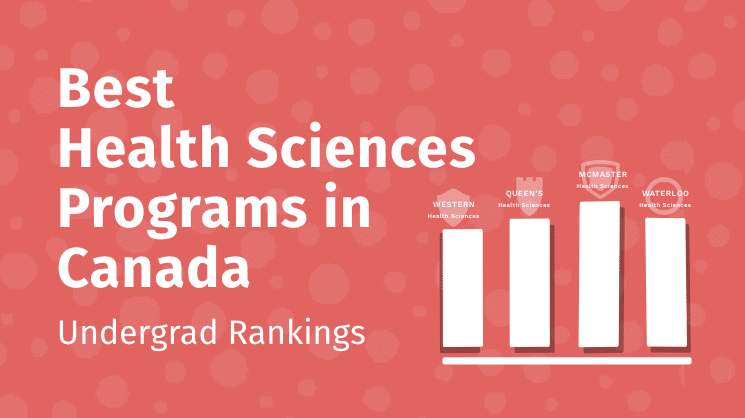
Rankings & Lists
Best Health Sciences Programs in Canada 2024 (Undergraduate)
You’re investing a TON of time, money, and energy towards your future. You’ve gotten the grades, done a bunch of… Read more
University of Alberta Nursing (Edmonton, Alberta) – Best Nursing Program in Canada for Degree Options & Honours BScN Degree
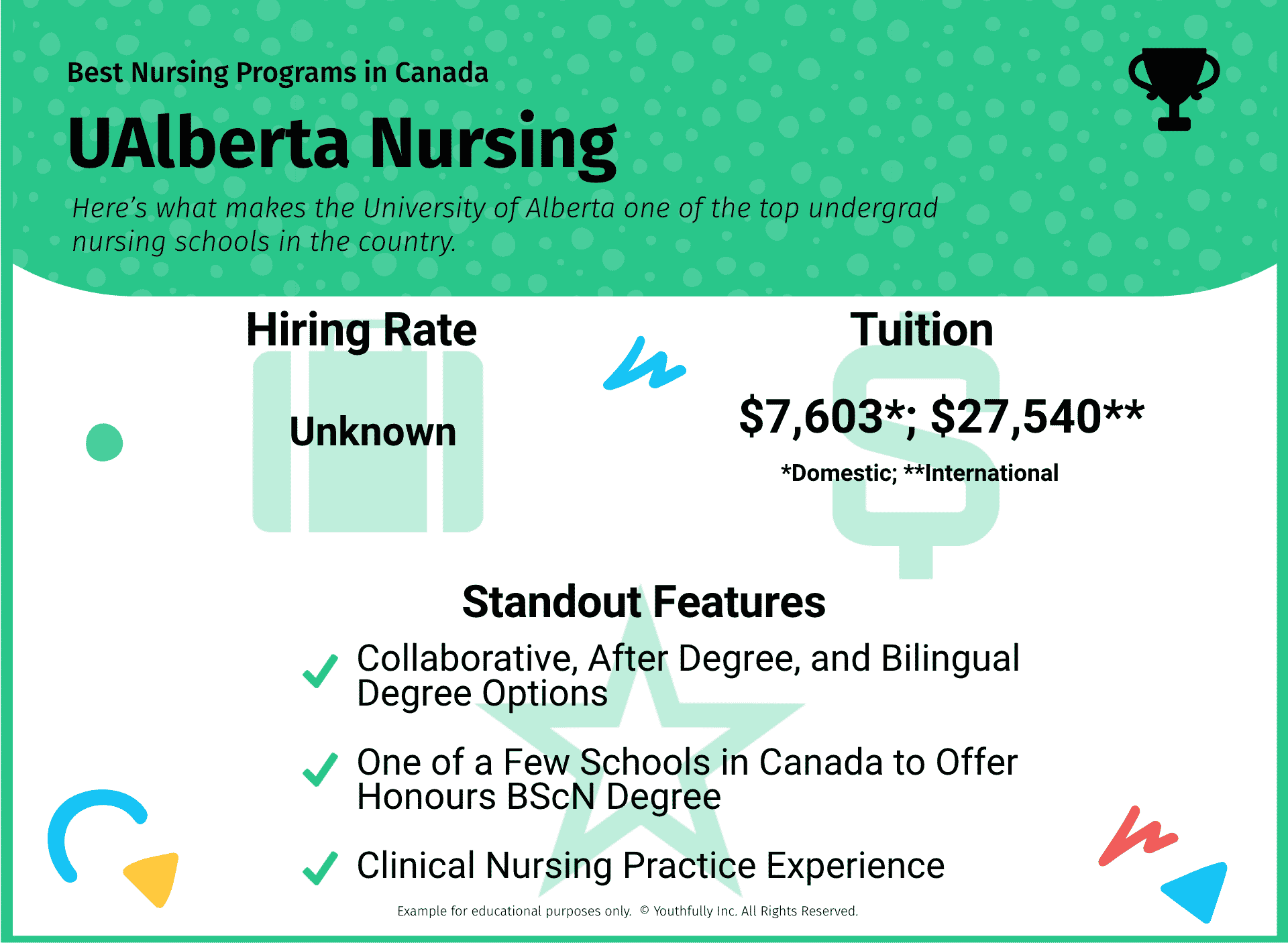
University of Alberta Nursing is one of the largest nursing schools in Canada and has been consistently ranked as one of the best.
Why? One reason is because of the multiple degree/program options, making the BScN program suitable for a wide variety of students and interests.
UAlberta Nursing has a unique Collaborative Program option, where you can complete the BScN at the University of Alberta or one of its affiliated institutions (Red Deer College, Keyano College (Fort McMurray), or Grande Prairie Regional College). You can do the first 3 years at 1 of these 4 institutions, and then the fourth year is completed at U of A.
This is a great option if you’re interested in studying outside of Edmonton, if you live somewhere else in Alberta, or if you want to experience other institutions. You will still take all the same courses no matter which location you’re in, but you will be able to work with different faculty and students, and be on a different campus until fourth year. It’s sort of like an exchange, except you don’t have to leave Alberta!
U of A Nursing also offers an After Degree Program, which is for students who have completed a degree in university prior to applying to Nursing and want to earn a Bachelor of Science in Nursing (BScN).
Or, there’s the Bilingual BScN program, where you can study nursing in both English and French. This option is ideal if you want to be able to provide nursing services in both languages or you want to work in Quebec. It will also give you more options for locations to work when you are done and make you a more competitive applicant.
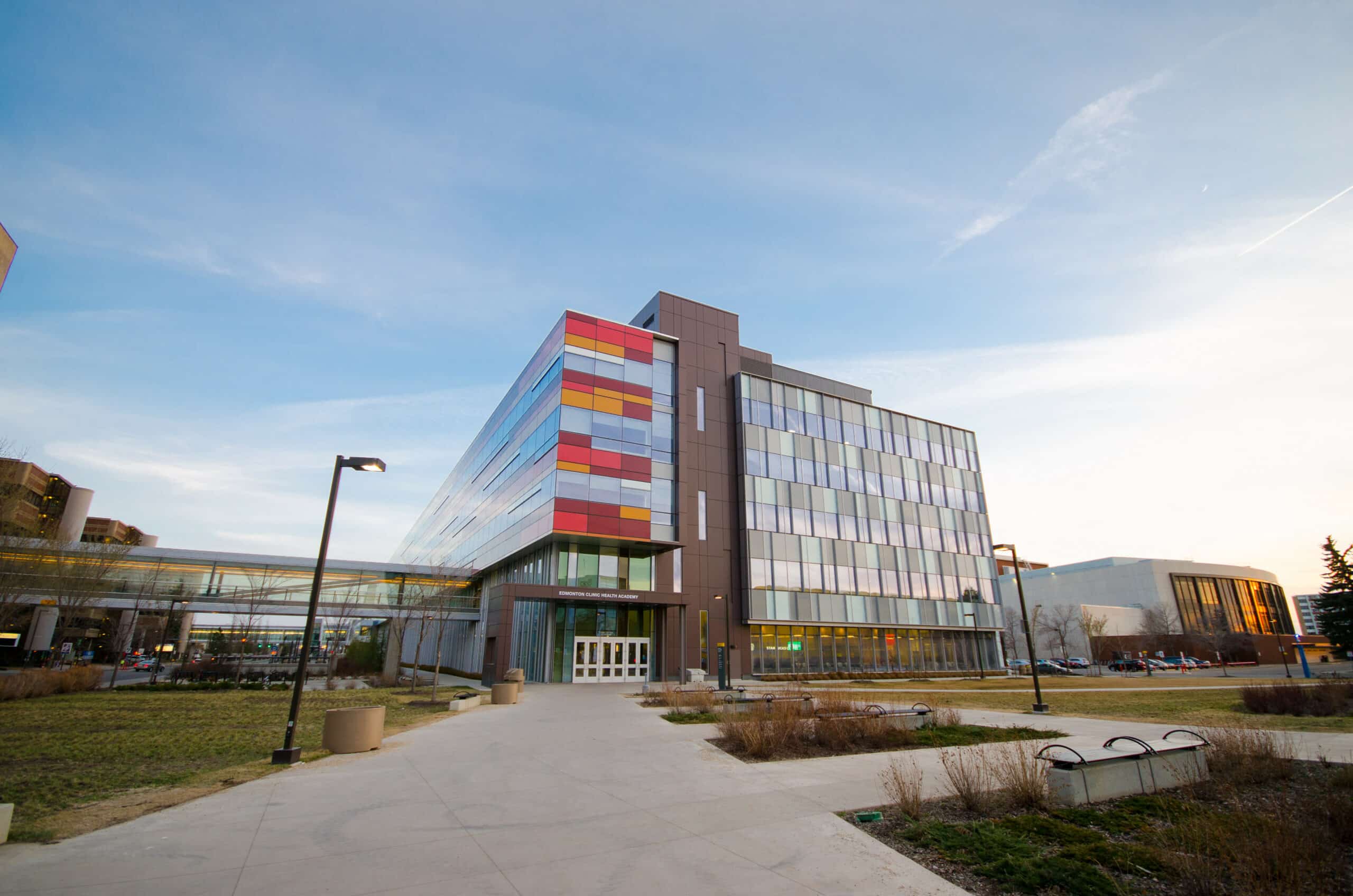
University of Alberta, Faculty of Nursing, image credit
U of A Nursing also has an Honours BScN program, which is for students from the Collaborative or After Degree programs. The Faculty of Nursing at U of A is one of the few nursing honours programs available in Canada.
This Honours program is a research-focused program, where you will be mentored by a faculty member and do meaningful research in a specific area of interest. This program is ideal if you want a career in research, plan on applying to graduate school, want to teach, or want to learn how to apply research to various healthcare settings.
DID YOU KNOW?: In 1975, the University of Alberta was the first to open a Master of Nursing program in Western Canada. It’s also the first Nursing PhD program in Canada in 1991.
As a BScN Honours student, you will learn how to do meaningful research, as well as how to communicate your research through conferences, presentations, and publications — all of which will make you a stronger applicant if you plan on applying to grad school or for a career in various healthcare and/ or research settings.
U of A Nursing is also a good choice if you want to gain real-world experience in various settings. They have many clinical placements which you must complete in concentrated blocks during your degree. There are many options and settings for where you can do the placement (see a map here). There’s also the opportunity to do an international placement, if that is of interest.
These placements allow you to apply what you’ve learned in the classroom, while also giving you hands-on experience that will benefit you as you complete your BScN and start working. They’ll also help you build a network of contacts and improve your skills in community/healthcare settings.
If you’re thinking about applying to the University of Alberta Nursing program, connect with a coach to see if this program is the best fit for you. We’ve helped hundreds of students improve real-world skills, stand out on their applications, and get accepted to this top nursing program.
Find the mentor you’ve been looking for.
get a youth coach™
Nursing at McMaster University (Hamilton, Ontario) – Best Nursing Program in Canada for Innovative Learning Methods
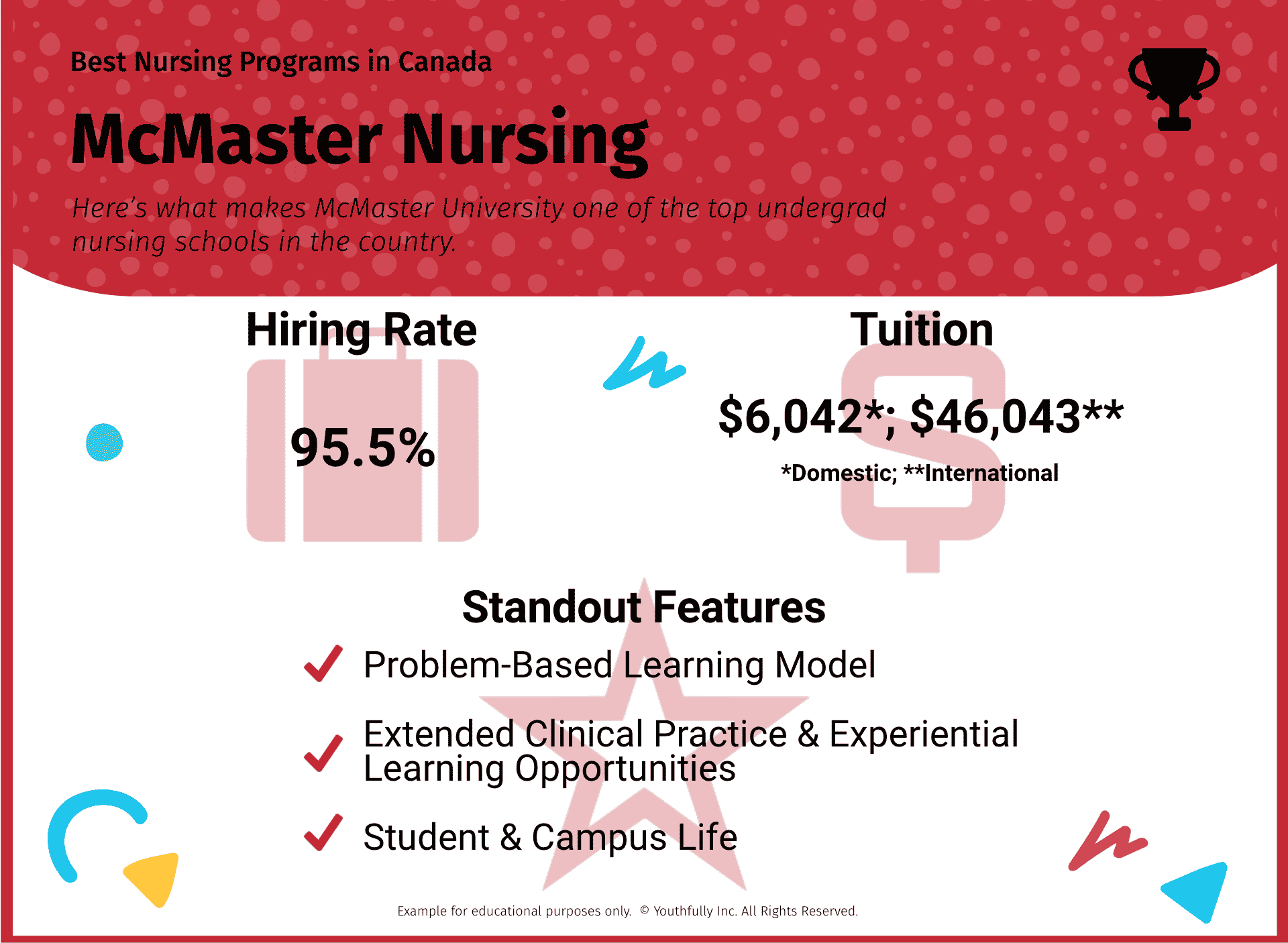
McMaster’s BScN is offered jointly with Mohawk College and Conestoga College, and is consistently ranked as one of the best nursing programs in Canada.
One reason is because of its problem-based approach to learning (aka PBL). Like McMaster Health Sciences, McMaster Nursing uses a student-driven learning model that emphasizes hands-on experience, collaboration, and communication.
Unlike traditional university classes, where you listen to a lecture and take notes with hundreds of other students, at McMaster Nursing you’ll be in small classes of around 20 students, while thinking about problems, doing research, and finding an answer. You’ll be given various scenarios, often with limited information, and you and your group have to come up with a solution.
This learning approach is unique to McMaster, and provides you with training and hands-on learning you won’t get at other schools.
Many students tell us that this learning method was effective for teaching them to think on their toes and solve problems while under a lot of pressure (which is a skill they in turn use later when they’re working in real healthcare settings).
DID YOU KNOW?: McMaster Nursing offers an Accelerated Stream, where you can complete the BScN degree in 20 months (or 5 academic terms), as long as you have already completed at least 2 years of university study. This is a good opportunity if you discovered your passion for nursing a bit later, or you’re looking to complete the BScN as soon as possible. They also offer a Post RPN Stream, which is a 3 year program for those who already have an RPN diploma.
McMaster Nursing provides many opportunities for experiential learning, such as with the Professional Clinical Practice. Here you will work with healthcare and community agencies of Hamilton, Brantford, Niagara, Halton, and surrounding areas, taking advantage of local teaching hospitals and community health settings.
At McMaster Nursing, clinical practice starts in your second year in the Basic Stream for 8 hours per week, and then it gradually increases in upper years (12 hours per week in Year 3 and 24-36 hours per week in Year 4).
This structure is a bit different from other nursing schools where students do it all at once or for a set amount of time (e.g. U of T Nursing where you do an 11-week practicum at the end of second year). With this structure, you’ll have an extended practicum for the majority of the time you’re working on your degree.
This might seem like a really big extra time commitment, but we’ve had many students tell us that this structure really helped them grow as healthcare professionals because they were learning both inside and outside the classroom for an extended period of time. It also gives you a bit of a break from coursework, and keeps you inspired as you help people, build your skills, and improve as a healthcare professional.

McMaster Nursing also offers other experiential learning opportunities like the preceptorship program helps senior students make the transition from school to the role of professional nurse using senior practice courses and mentorship from a preceptor and a faculty tutor.
In addition to the Professional Practice mentioned above, you can also take your learning to the next level by applying for a 12-week Canadian or International clinical placement in your final year of the program. This is a really unique opportunity because you will work in a remote, lower-income healthcare setting and be challenged to gain new perspectives on social, economic, and cultural factors that affect health.
Apart from academics, the Nursing program at McMaster is ranked highly for its student and campus life. Within McMaster University, there are over 300 clubs, including cultural clubs, teams, and athletics. With everything from a cinema society to a trivia club, you’ll definitely be able to find something that’s of interest.
Within the McMaster School of Nursing itself, there’s the McMaster University Nursing Students Society (MUNSS) which oversees events, conferences, educational opportunities, mentorship programs, and more. Taking part in these extracurriculars is a great way to collaborate with your peers, enhance your university experience, and try something new.
Hamilton, Ontario is also a beautiful city. Called the ‘City of Waterfalls’ (with 100+ waterfalls within the city’s limits), you can go for hikes, take a short trip to Toronto or Niagara, explore the diverse restaurants, visit a museum or sporting event, and much more. There’s always something to do that’s not school-related — and that’s super important for your mental and physical health when you need a break from school stuff.
If you’re thinking about applying to the McMaster Nursing program, connect with a coach to see if this program is the best fit for you. We’ve helped hundreds of students improve real-world skills, stand out on their applications, and get accepted to this top nursing program.
You Might Also Like
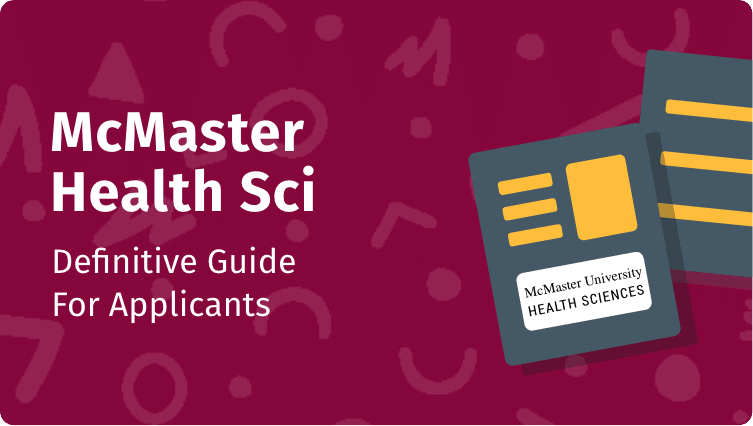
Program Guide
McMaster Health Sciences (BHSc): The Definitive Guide for Applicants (2024/2025)
If you’re applying to McMaster Health Sciences (BHSc), or you’re simply interested in learning more about the program, this guide… Read more
Nursing at McGill University (Montreal, Quebec) – Best Nursing School in Canada for Strengths-Based Approach to Nursing
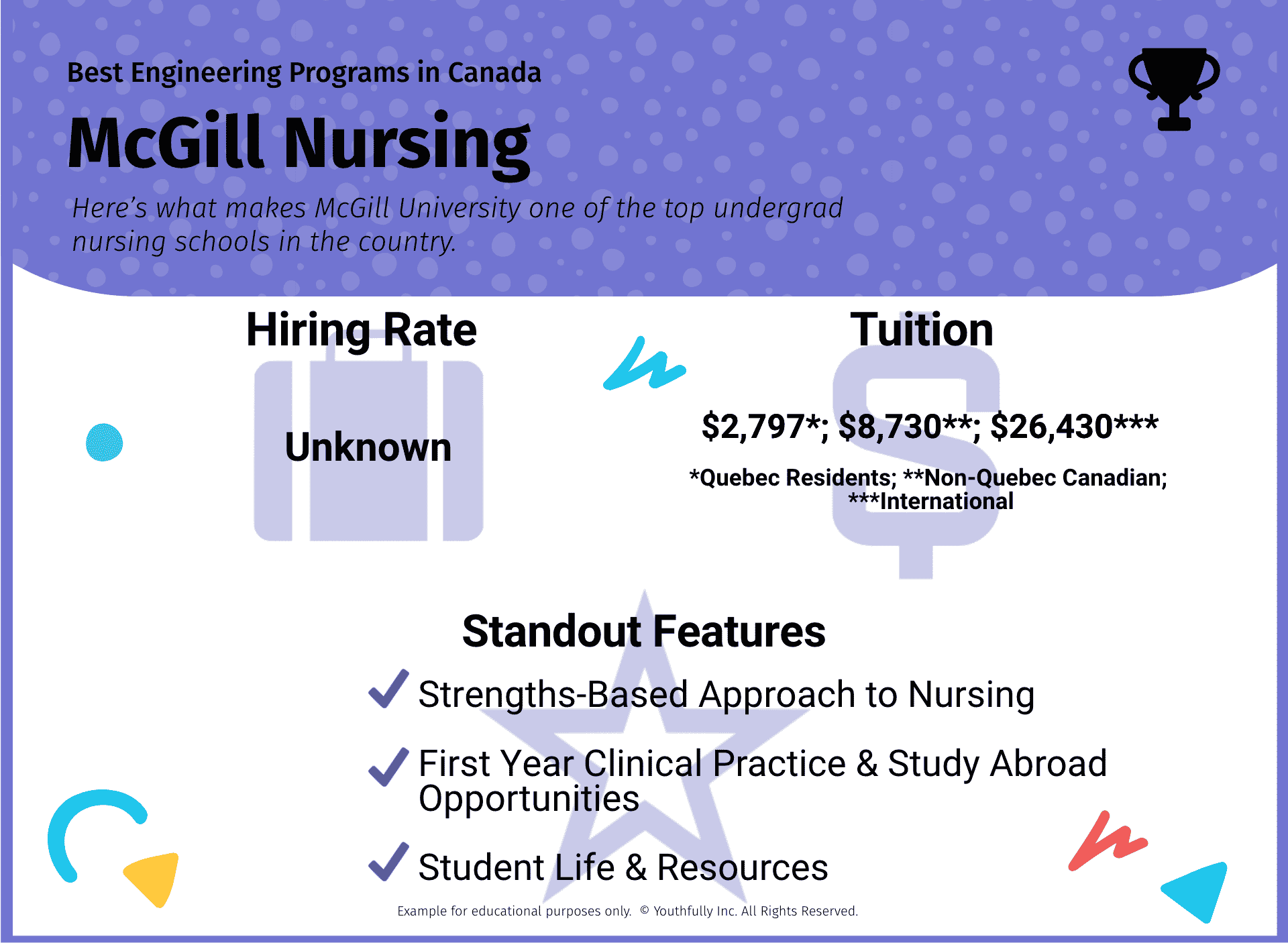
McGill University’s Ingram School of Nursing has maintained a high reputation of educating nurses for more than 100 years.
The Nursing program at McGill is one of the best nursing schools in Canada because of its innovative approach to healthcare, called Strengths-Based Nursing and Healthcare (SBHH). This approach was implemented into the curriculum and all clinical learning experiences in 2017.
This holistic approach to care teaches students to use a patient’s strengths to promote health and healing, while empowering patients and their families. People aren’t simply cases, and there’s an opportunity to collaborate with patients and their families to make them better.
As a student at McGill Nursing, you’re education will be under this approach, focuses on these values: Health & Healing; Uniqueness; Holism & Embodiment; Subjective Reality & Created Meaning; Self-Determination; Person-Environment are integral; Learning, Readiness & Timing; and Collaborative Partnership (learn more about each here).
McGill is also developing online modules to help students and preceptors practice and teach this approach.
While some other schools will teach you about healthcare and nursing in a formulaic way, where you take classes on certain subjects and then write exams before doing your clinical placement, McGill Nursing’s Strengths-Based Approach goes above and beyond traditional curriculum to teach you how to interact with patients and their families and provide a next-level type of care that will make a difference to them and their families. It will train you to think differently about effective healthcare and empower you and your patients, making you a better nurse in the long-run.

Ingram School of Nursing, McGill University, image credit
McGill Nursing also stands out because it’s one of the few schools in Canada to give first year students a chance to do clinical studies in the community (other schools like U of T Nursing does the clinical practicum at the end of the program, while McMaster Nursing does its clinical practicum starting in second year).
Regardless of whether you choose a hospital or community clinical experience, starting it in your first year is a HUGE advantage because you will get real-world training and experience right from the start of your degree. This will help you refine your expertise, teach you lessons you wouldn’t get in the classroom, and let you really explore your interests.
DID YOU KNOW?: When you complete your BSc(N) degree at McGill, you must pass an exam (in addition to the licensing exam) to show that you can communicate (written and verbally) in French if you want to work in Quebec. If you have completed 3+ years of French instruction at a post-primary school, you don’t have to take the exam. We HIGHLY recommend that you work on passing this exam BEFORE you graduate so that you don’t have to delay getting certified and finding work afterwards. McGill has various French courses you can take throughout your studies to help prepare you.
McGill also offers its students the chance to study abroad for an entire semester in the final year, including a clinical internship (which can be done nationally or internationally). This is a good opportunity to learn about healthcare in an international context, including different perspectives, policies, and systems — all while learning about different cultures and locations. These types of experiences will help make you more competitive as you apply to your first job.
Another reason that McGill Nursing continues to claim a top spot for the best nursing programs in Canada is because of its focus on student support. Their Peer Mentorship Program is a very valuable resource if you need some help getting used to university life and want to get to know some friendly people who are also in the program. These types of programs are essential for helping you feel like you’re supported and part of a community (which is really important for your mental health).
DID YOU KNOW?: McGill BSc(N) graduates tell us that this program can be really difficult at times and can be quite stressful. This is mostly because of the course material, the science-focus, and the workload. Don’t let this scare you though! If you work on building key skills like time management, organization, and learn how to study strategically, you’ll be just fine. There are also a ton of student resources and support at McGill that can help you get through the program. Just remember that nothing worth doing is easy, and McGill graduates never have a hard time finding a job! 🙂
There are also various opportunities to get involved within McGill’s Ingram School of Nursing. The Nursing Undergraduate Society (NUS) has various clubs and events where you can get involved and make lifelong friends. McGill itself also has dozens of student societies, clubs, and teams where you can take a break from your studies and try something new.
McGill Nursing is also in the heart of Montreal, which makes student life even more fun. When you need a break from studying, there are a ton of concerts, sporting events, museums, festivals, and more to check out (often free or discounted prices for students).
There’s always something new to explore and every area of the city will make you feel curious and engaged, no matter what part of the world you’re from. Trying new things and having the freedom to explore is great for your mental and physical health, especially when you’re in such a demanding program.
If you’re thinking about applying to the Nursing program at McGill University, connect with a coach to see if this program is the best fit for you. We’ve helped hundreds of students improve real-world skills, stand out on their applications, and get accepted to this top nursing program.
Queen’s University Nursing (Kingston, Ontario) – Best Nursing School in Canada for Experiential Learning
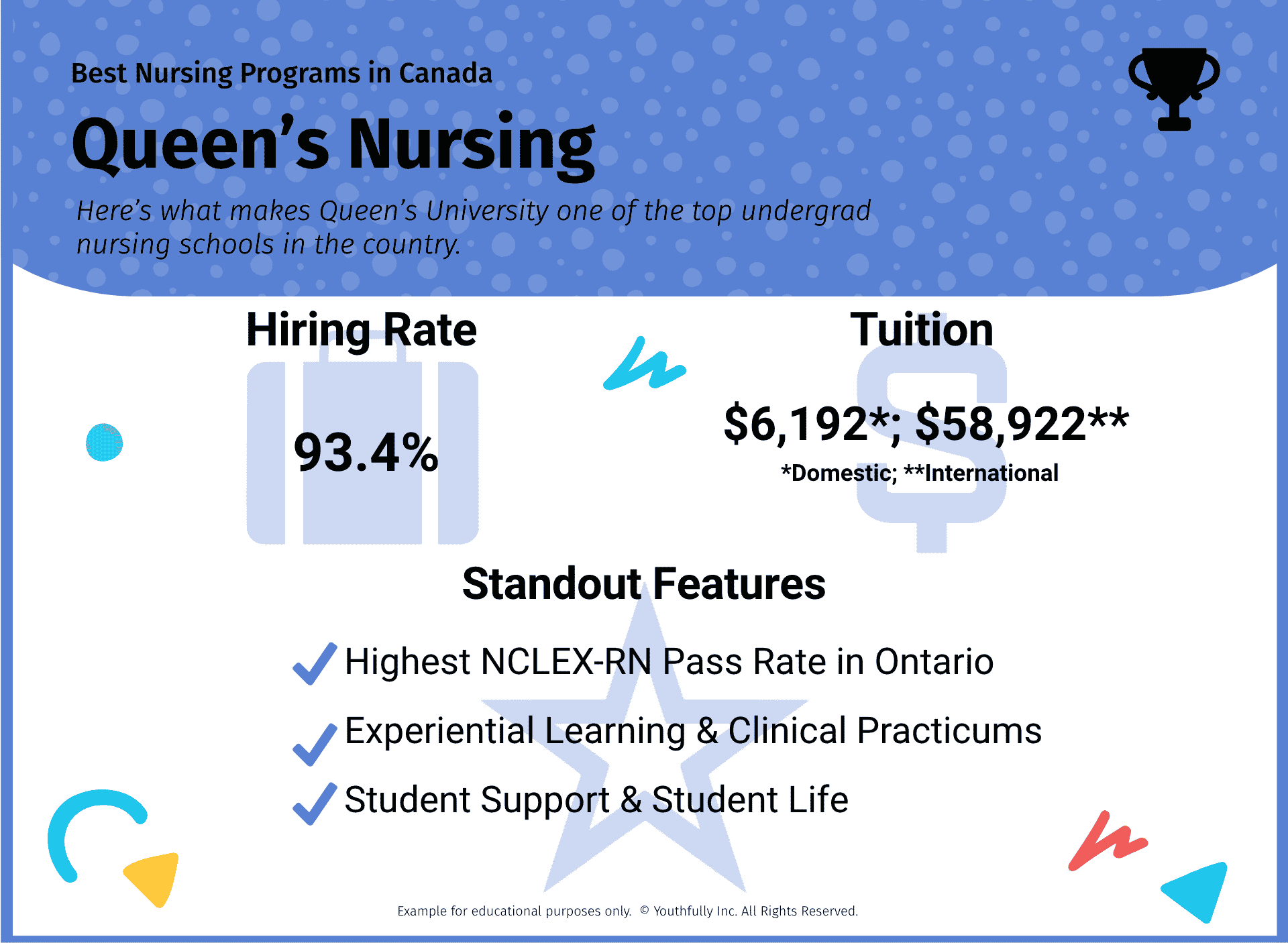
Queen’s Bachelor of Nursing Science (BNSc) is a top-ranked program for many reasons. Firstly, Queen’s BHSc students have the highest average first-time NCLEX pass rate in Ontario, with 97.4% of graduates passing the exam on their first try (vs. the national pass rate of 85.8% and 83.8% in Ontario).
Part of this high exam success rate is because of the curriculum and professional development opportunities throughout the program. In Year 1, you will take comprehensive and foundational courses introducing you to the fundamentals of the program. At the same time, you will have a chance for experiential learning by interviewing people at clinics and learning how to do assessments in the simulation lab.
Queen’s Nursing offers students various opportunities to learn in real-life settings. For Year 2-4, you will do labs as well as clinical practice in the fields of children’s, maternity, mental health, hospitalized patients, and/or community settings. If your main interests are in one of these areas, then Queen’s Nursing is definitely a good choice, because you will get a ton of hands-on experience in these settings.
Many students also say that Queen’s nursing stands out because of the variety of placement areas, allowing them to get experience in a bunch of different settings and scenarios.
Once you get to Year 4, you will also do 1 clinical practicum in the fall and winter, and then a final clinical practicum of 400 hours. This might seem like a lot, but the lessons you will learn will be invaluable. Not only will you be able to apply what you’ve learned in the classroom to real-world situations, but you will learn about what it’s really like to work in various healthcare settings and gradually improve your skills.
DID YOU KNOW?: Queens Nursing also offers an accelerated 2-year BNSc degree. If you have already completed a secondary school degree or at least 10 full university courses, then you might be eligible to apply. It is the exact same degree, with the exact same courses and clinical hours, just in less time.

Cataraqui Building, School of Nursing, Queen’s University, image credit
Student life and the faculty’s focus on student support also makes Queens Nursing a top-tier program.
There are a ton of activities and clubs on campus, like volunteer/employment opportunities, athletics, extracurricular activities, student government, and networking events. All of these will not only give you a break from your studies, but will also help you build real-world skills through experiential learning.
Within the faculty itself, there’s the Nursing Science Society (NSS) where you can interact with your peers, make lifelong friends, and take part in some fun events and extracurriculars.
No matter what you need, there’s always someone there to help — and, trust us, this will make a huge difference to your university experience. For example, their Student Wellness Services and AMS Peer Support has various resources and support programs to promote health and wellness. There are also Academic Success Services if you need help with your studies or mapping out your courses or creating study strategies. Throughout the entire time you are in the program, you will have access to these services.
This tight knit, supportive community is another advantage of going to a university like Queen’s, whose student body is slightly smaller than other universities, and it has the resources to make sure that you are part of a caring community. University can be tough, but it is a game changer to know that you aren’t alone.
Kingston, Ontario itself is also a beautiful city, full of history and charm. It’s small enough where you can easily get around and explore, but big enough that there’s never a dull moment. There are a ton of museums and galleries, sporting events, restaurants, and nightlife to give you the break you need from your studies.
If you’re thinking about applying to Queen’s Nursing, connect with a coach to see if this program is the best fit for you. We’ve helped hundreds of students improve real-world skills, stand out on their applications, and get accepted to this top nursing program.
You Might Also Like
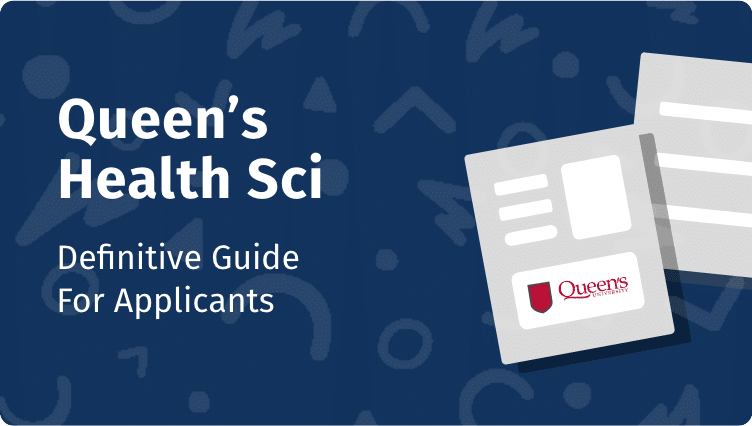
Program Guide
Queens Health Sciences: The Definitive Guide for Applicants (2024)
If you’re applying to Queen’s University for the Bachelor of Health Sciences (BHSc), or you’re simply interested in learning more… Read more
University of Calgary Nursing (Calgary, Alberta) – One of the Best Nursing Programs in Canada for Holistic Curriculum
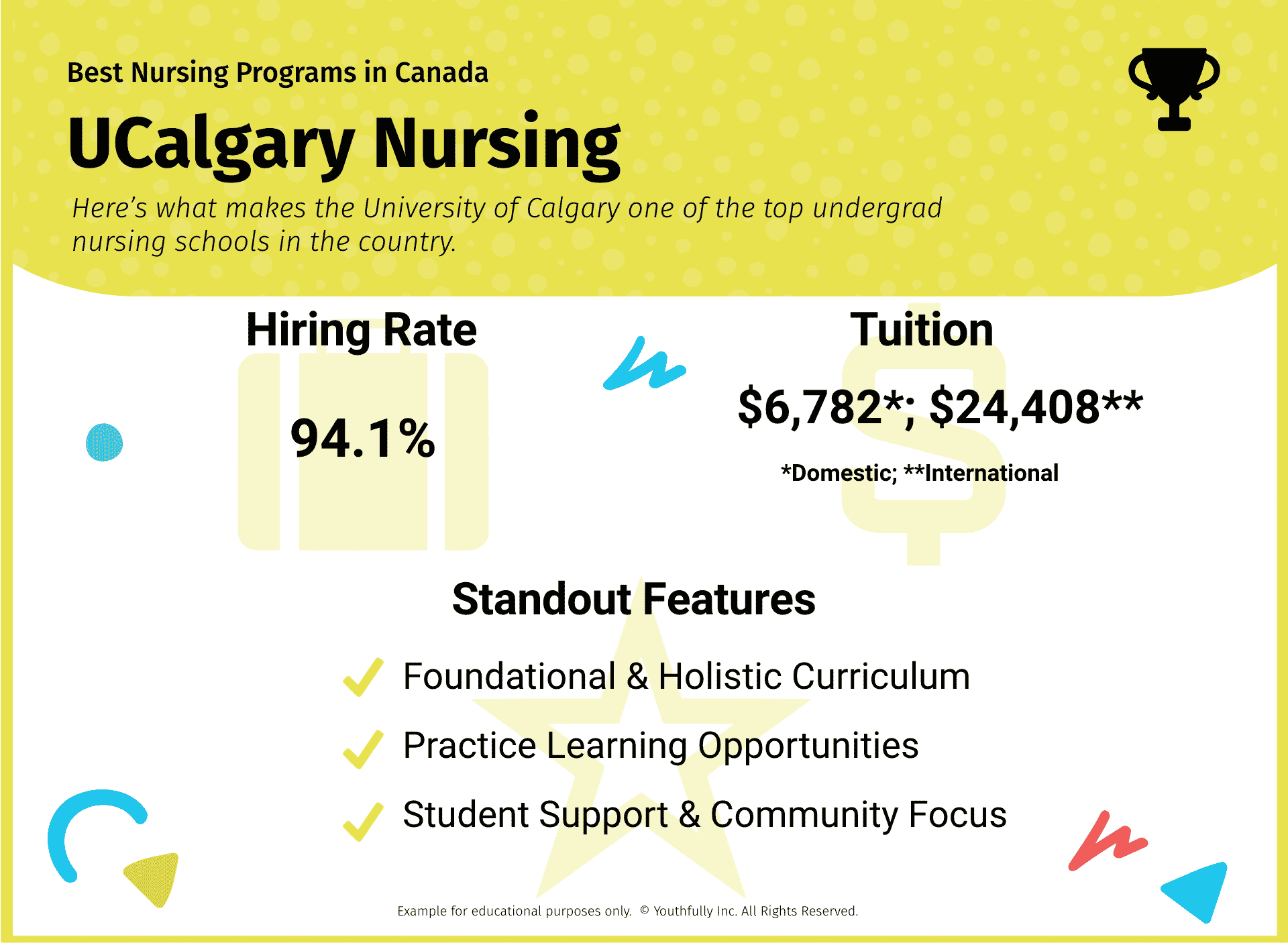
The University of Calgary’s Bachelor of Nursing (BN) program is consistently ranked as one of the best nursing programs in Canada because of its foundational and comprehensive curriculum which focuses on integrating theory and practice.
As a UCalgary Nursing student, you’ll become a well-rounded healthcare professional while also giving you the tools and skills you need to continue to learn, research, and evolve.
You’ll not only learn how to become an effective healthcare provider, but you’ll learn essential skills and knowledge that will help you both academically and professionally. You will get a strong theoretical knowledge, and then learn about effective ways to apply it to nursing.
In your first year, you’ll focus on foundational studies with mandatory courses like anatomy, English, Philosophy, and more). The ultimate goal is to give you the necessary background you need to get used to university, while giving you a solid foundation beyond nursing.
From there, each subsequent term focuses on a specific area related to nursing, like Core Skills/Community Health (in term 3), Family Nursing (in term 4), Acute Care (term 5), and Chronic Illness (term 6). You’ll also build skills like problem solving and collaboration, as you work with a team to complete projects and labs.
In upper years, you’ll continue to focus on building skills that you can learn in all aspects of your life, like Leadership (Term 7). You’ll also learn how to take everything you’ve learned throughout the program and learn how to apply it as you transition to the role of registered nurse in the last term.

Faculty of Nursing, University of Calgary, image credit
University of Calgary Nursing also gets a top spot as one of the best nursing schools in Canada because of the opportunities for practice learning. You’ll get over 1,600 hours of experiential learning in a practice setting and clinical simulations.
At the same time, you will get to work with a group of 8 students, giving you the opportunity to talk about things you’re having trouble with, work through problems, and learn in a collaborative and accepting environment — not to mention that this group will become lifelong friends who you can depend on.
DID YOU KNOW?: UCalgary Nursing has a really high NCLEX results rate! In the 2021-22 year, the first time pass rate for UCalgary Nursing students was 93%!
Another aspect that makes the nursing program at the University of Calgary stand out is the university’s focus on student support. It can be really difficult to adapt to university and meet the demands that are expected of you. At UCalgary Nursing, there are various ways that you can get support for all aspects of your academic journey.
If you need help any time along the way, University of Calgary Nursing has various support groups, like the NP Mental Health Clinic and the Mental Health & Wellness Engagement Committee. There are also various mental health resources like workshops, webinars, and events.
UCalgary Nursing also makes a consistent effort to create an inclusive community. Their Nursing Inclusivity Committee (NIC) advocates for culturally diverse and minority populations so that each nursing student feels valued and accepted. There’s also Peer Mentorship to help you acclimatize to university, connect with other nursing students, and address any issues that come up during the program that you need help with, as well as clubs like the Undergraduate Nursing Society (UNS) where you can make friends, go to networking events, and really feel like you’re part of a community.
If you’re thinking about applying to University of Calgary Nursing, connect with a coach to see if this program is the best fit for you. We’ve helped hundreds of students improve real-world skills, stand out on their applications, and get accepted to this top nursing program.
Nursing at Western University (London, Ontario) – One of the Best Nursing Programs in Canada for Experiential Learning & Teaching Facilities
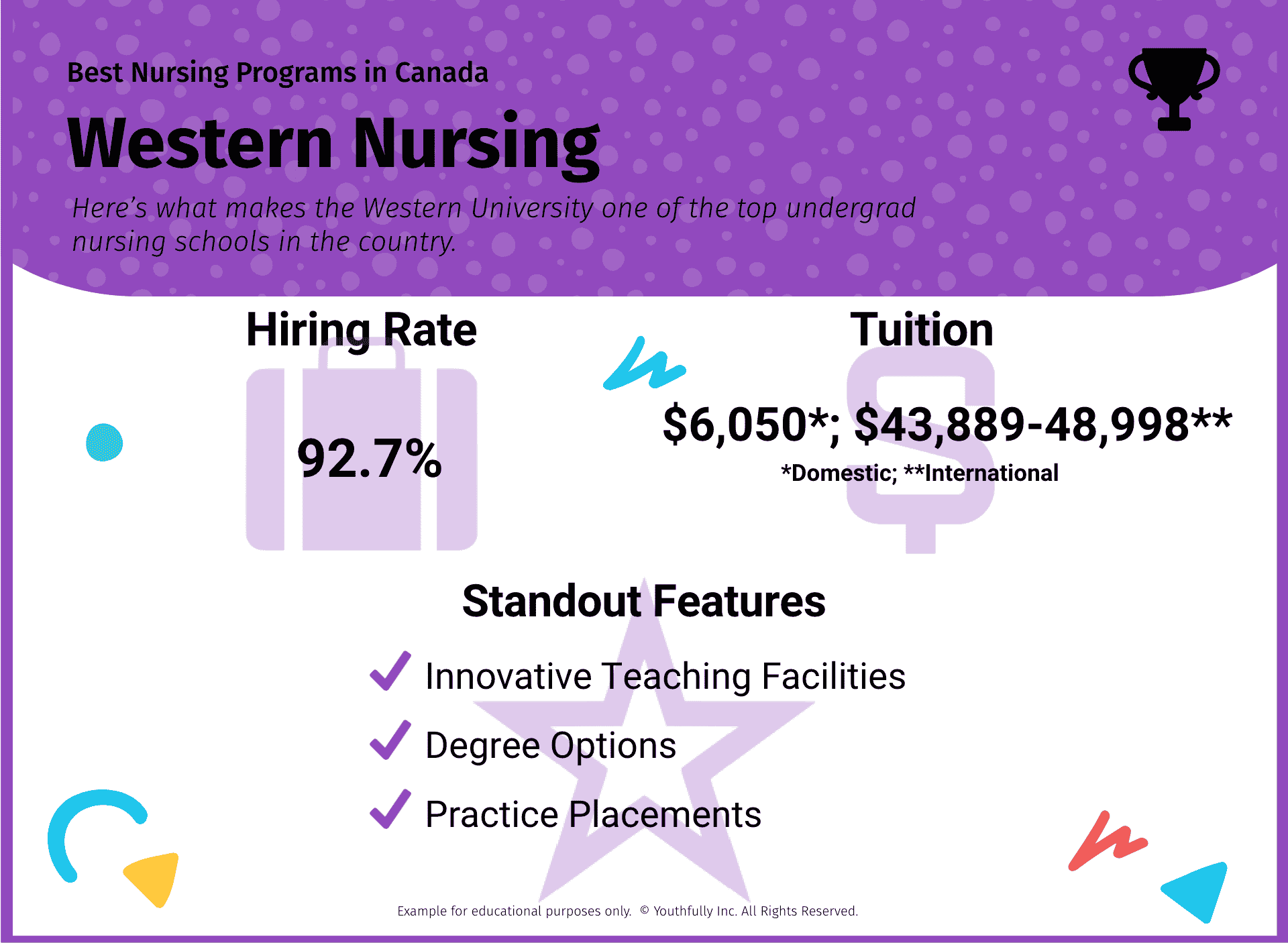
Western University has been providing students with a comprehensive nursing education for over 100 years.
One reason that nursing at Western continually ranks highly as a top nursing program in Canada is because of its renowned teaching facilities.
Western Nursing has a simulated education site which uses advanced technology to simulate scenarios in an immersive learning environment. In a small group of fellow students, you will either work with live patients and/or simulators in a hospital setting.
There are also Clinical Skills Labs, where you’ll learn how to use real equipment and materials in a structured environment and complete increasingly complex lab activities in a small group.
These types of learning environments are so valuable because you will be able to develop your skills, while in an environment where you feel safe. This will give you a chance to learn about what works and what doesn’t, all while collaborating and using teamwork to find solutions to various problems.
This type of education goes far beyond traditional classroom learning, and takes clinical practice to the next level. You’ll build confidence in a low-risk setting, and it will motivate you to continually improve.
Western Nursing also stands out because of its Practice Placement opportunities, which students do in Years 2-4. You’ll take everything you learned from class and the simulated labs and get real, hands-on experience.
You will have the opportunity to do placements both within London, as well as in the southwestern Ontario region more generally (with at least one being outside the city of London).
If you’re interested in getting experience in children’s treatment, community support services, long-term care, and teaching/community hospitals, then Western Nursing would be a great choice since there are many placement opportunities in these areas.
However, keep in mind that obstetrics, pediatrics, and mental health placement positions are somewhat limited (and the school itself says they can’t guarantee a placement in these areas), so if any of these 3 is your passion, make sure you address this with an admissions officer or someone in the faculty before accepting your offer.

FIMS and Nursing Building, Western University, image credit
Another reason that Western Nursing is ranked so highly is because of its various degree options to suit many types of students in all different stages of their nursing education journey.
Students can choose from 3 study options. Western University and Fanshawe College have partnered to offer the Bachelor of Science in Nursing program with the Western-Fanshawe Collaborative BScN Program. Here, you have the option to do 4 years of the program at Western, or you can do the first 2 years of the program at Fanshawe and then go to Western. The coursework and the degree is the same no matter which location you choose. This degree option is meant to help make admission more accessible and allow more students to be accepted into the program, but make sure you apply to both (because it’s possible to get into one location and not the other).
Western also has a 19-month (or 5 consecutive terms) fast track program if you have already attended university and completed at least 10 courses, called the Compressed Time Frame BScN Program. Once completed, you are qualified to apply for registration with the College of Nurses of Ontario. Finally, there is a degree option if you’ve completed the Fanshawe College 2-year Practical Nursing Diploma Program or a minimum of 5.0 university credits, called the RPN to BScN Pathway (CTF Program). After completing this 19-month program, you are qualified to apply to the College of Nurses of Ontario. This program is also unique because you can get funding of up to $10,000 per year!
If you’re thinking about applying to Western Nursing, connect with a coach to see if this program is the best fit for you. We’ve helped hundreds of students improve real-world skills, stand out on their applications, and get accepted to this top nursing program.
You’ve Got a Dedicated Coach in Your Corner
For over a decade, we have worked with thousands of students to help them achieve more than they ever thought possible.
Our coaches have a strong success rate supporting students as they apply to leading Nursing programs like those mentioned above, among other top university programs.
Our 1-on-1 Youth Coaching fills that gap that most high schools miss. We can help you build self-awareness through probing questions and assessments, set bigger goals to elevate your extracurriculars and future career plans, and improve skills that matter on supplementary applications, such as interviewing, written communication, critical thinking, and creativity.
We use a coaching methodology, called ‘full student’ development, that’s been proven to increase your chances of admission to top-tier universities and obtaining competitive jobs/internships.
So, what are you waiting for? Fulfill your post-secondary potential with the mentorship and coaching you’ve always wanted! 🙂
IMPORTANT: Want to share information and/or images from this resource on your own website, blog, article, etc.? Please ensure you reference content of any kind published by Youthfully Inc., in whole or in part, using the following statement: (1) Our Organization (Youthfully Inc.); (2) The title of our content/resource; and (3) the URL to our webpage where the content was originally posted. For example: “Sourced from: Youthfully Inc., “Best Nursing Schools in Canada 2022/2023 (Undergraduate Programs)”,’ https://youthfully.ca/best-nursing-programs-in-ontario-and-canada.” Not doing so is an infringement of copyright and is illegal. We spend significant time developing resources for students, so please take a few seconds to ensure they are referenced properly.
Disclaimer: While the information in this blog is considered to be true and correct at the date of publication, and although our team makes every attempt to ensure that the information is accurate and vetted by university staff, Youthfully is not in any way liable for the accuracy of any information printed and stored or in any way interpreted and used by a user.
Get 1-on-1 Support


